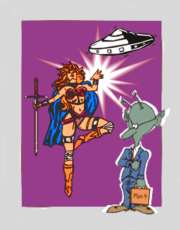Home Search Level 0 Level 1 Level 2 Level 3 Level 4 Level 4Pro Level 5 C/Sing Solo
| Tech terms | Scales | Axioms | Drills | Checksheets | Processes | Prep. lists | C/S terms | C/S tool | Grades | Cramm | Points | KTW | Online |
|
Home Search Level 0 Level 1 Level 2 Level 3 Level 4 Level 4Pro Level 5 C/Sing Solo |
|
|
| Tech terms | Scales | Axioms | Drills | Checksheets | Processes | Prep. lists | C/S terms | C/S tool | Grades | Cramm | Points | KTW | Online | |
Engram Clearing Remedies
Pc's who seem very sleepy in Engram Running, despite enough sleep, may need
special remedies to handle the situation. They are said to dope off or "go anaten"
(somewhat unconscious caused by restimulation). The remedies will also handle
high TA. The above phenomena are usually caused by Engram Chains in
restimulation and not taken to full Engram Running EP. Before going into any of
this you would of course make sure it is not simply lack of sleep. If the pc
hasn't slept enough he shouldn't be audited, but get rested up. If the condition
persists the remedies will apply.
Word Clearing
The auditor should already have done Basic Definitions for Engrams with the pc.
This is still the first thing you have to look at. Does the pc understand the
procedure and commands? A pc who
does not understand R3RA commands, Assessment procedures, etc. will only
restimulate masses in Engram running sessions. He will not be able to erase the Engrams properly.
If there are any doubts that pc understands the commands and procedures of R3RA, you clear these up right away. There are two things in general that can prevent pc's from running Engrams well: (1) not understanding the procedure and the commands. (2) Unhandled drugs on the case. Drugs should already have been taken care of at this point.
 |
Pictures and Masses can make a pc |
Pictures and Masses
Remedy
The following remedy can be ordered by the C/S. It is used when the pc has no
misunderstood words but still becomes very sleepy or goes anaten in session.
Before ordering it, the C/S makes sure of the following:
1) Pc has had enough sleep.
2) The pc understands the words and procedure and it is correctly done in session.
3) The Engram Drug RD has been done to EP.
4) There are no obvious unflat Chains from folder inspection. If there is, they should simply be repaired and taken to EP.
The pc would usually have very high or low TA. The essence of this remedy is simply to complete something that was
already started or stirred up but not completed.
The auditor asks:
"What pictures or masses have you touched on in life or in auditing that have been left unhandled?"
Pictures
The pc may give auditor an engramic picture. The auditor would take the best
reading picture and finish the Chain it was part of to EP. Make sure all 4 flows
of the Running Item was taken to EP. If not, complete what's missing.
Such an isolated picture may have to be run with Narrative commands if pc does not know what Running Item it belongs to or if it doesn't belong to any such Chain. If pc remembers what somatic Chain it was part of auditor would use regular R3RA procedure and simply complete the item, Quad flows.
If it was some kind of stuck picture which simply appeared in pc's mind,
auditor can
treat it as an Original Item per the Assessment data.
Masses
Masses are handled simply as an Original Item as in the Assessment data.
As Original Item
If the offered items in this remedy are hard to pinpoint to an earlier unflat
action, the auditor can simply treat it as an Original Item. When the pc gives
the auditor a list of "pictures or masses that have been
touched on in life or auditing" you can look at it as pc is really giving you a list of
Original Items as far as the handling is concerned. The auditor can simply take the best reading item from
that list and do a Pre-assessment on it. He would use:
"Are/is (Pre-assessment Item) connected with (item)?"
The auditor then follows the normal procedure from here. When this action is correctly done the TA of the pc will be back in range, and the pc will feel much better.
 |
"Automatic Pictures"
usually |
Automatic Pictures
Pc's can have "Automatic Pictures". The pc is complaining of
pictures coming at him too fast and completely out of his control. This is an
unusual phenomenon for pc's having completed Ability Clearing, Grade 0-4, but should it happen
there is a handling for it. Such pc's also tend to dope off in
session and they are somewhat hard to get an F/N on.
The thing which is really wrong with the pc is instability.
He can't hold things still. The best remedy is Objective Processes. The
processes "Hold It Still" and Start-Change-Stop are especially needed. They
should be checked and flattened. After flattening Objectives it will be found that the pc's
Bank is more stable.
As the phenomenon may also have keyed in something else. The C/S could order the
following after Objectives are flat: Ask the pc,
"What pictures have you seen in life or auditing?"
and treat the best reading items in the resulting list as Original Items.
Overts
If the pc goes anaten in session but there is no evidence
of unflat Chains, the C/S can use:
"Assess for:
Overts on unconscious people
Overts on anaten people
Overts on asleep people
Overts on sick people.
"Run each reading item with interest R3RA Narrative Quad, running F2 first."
The C/S could vary the Assessment items.
 |
Pc can be afraid of or disbelieve |
Imaginary Incidents
Sometimes a pc cannot confront the actual incidents that are keyed in by life or auditing.
The pc will not go backtrack. In this case the
running of imaginary incidents can be used. Sometimes they run with somatics and
everything. He is not made to admit that any such incident is real as part of
the problem is, pc's fear of his past and responsibility for it. Also disbelief
plays a role.
Please understand, that no amount of imaginary incidents
can replace the running of real incidents. But running them builds up pc's confidence in the auditor. The
pc begins to feel that it is all right to give fantasy.
When the pc finds out that the auditor will listen to imagination and even encourages it, the affinity level
goes up and the his ability to differentiate between fantasy and reality will
rise as well.
The auditor must never insist that the incident run was real. This would be a break
of Auditors Code.
To run imaginary incidents, the auditor discusses with the pc
how they will be running imaginary incidents and gets the pc's agreement to do
so.
The auditor then asks: "What imaginary incidents or
pictures have you touched on?"
All the pc's responses to this question, with their Meter
reads are noted by the auditor. He then takes up the best reading incident or
picture and runs it out R3RA Narrative Quad, first checking interest. Lesser
reading items are then taken up. This action is done until the pc is brighter and more able to
confront actual incidents as they come up in auditing.

|
The major Basic Engrams on a case |
Note: These remedies were all developed before 1981. With the present Grade Chart Engram Clearing is run after Grade 4 and there should be less need for or concern about this. The rearranging of the Grade Chart was in part due the difficulties described here. The remedies are however part of a C/S' tool box and bags of tricks and can be used in different situations.
Pc's who cannot go earlier than this life on Engram Chains are not likely to find and erase basic incidents. As a result, if this is not just on one and two Chains, the pc will not get the full benefit from Engram Clearing. This is so true at this level so you can say: A pc who is unwilling or unable to go earlier than this life will not recover. In Engram Clearing we are after erasure of basic incidents. That is where the postulates that aberrate the pc are found. Unless you find the basic incidents, and then the postulates in these incidents, an erasure has not been done. It is thus vital for the pc to be able to go back track at this level. On the Grades 0-4, where we go for key-out, this is not a major issue. But here on Engram Clearing we have to find the heavy incidents and get the pc through them to a successful erasure or he won't permanently benefit from the processing.
There is however another rule, not less important to lasting results, and that rule says: Never force a pc. Obviously, simply keep forcing the pc to go earlier than this life is not an acceptable solution. It is against this rule and a form of invalidation. Fortunately there are other roads open to overcome this hurdle. We have to parallel the pc's mind to find a way around this. There are several roads open.
Imaginary Incidents
One remedy, as covered above, is to run incidents as imaginary incidents. This
was also covered in Ron Hubbard's book, "Science of Survival" in the
chapter, Imaginary Incidents. The auditor clears the idea of
imaginary incidents and running them, then persuades the pc to run them without
forcing him. Delusion tends to run off but the real incidents move into
view as well.
These imaginary incidents can be run R3RA Narrative or done as part of R3RA procedure and running usual items and somatics. It can be used in context with a Pre-assessment. In all this it does not change the procedure itself. It is simply the R-factor and agreement between auditor and pc, leading up to this, that sets the stage. The auditor reassures the pc that imaginary incidents are fine and reassures the pc that he will accept any such incident for whatever it is worth and not speak another word of it. Embarrassment may come off; the pc may invalidate it all as "silly ideas and fantasy". Thus in handling this Auditors Code and good TRs are important.
One reason pc's have difficulties running track are drugs. That is one reason
you on the Engram Drug RD run this life Narrative incidents of taking
drugs/alcohol first. The problem of going earlier than this life will however
have to be resolved before a full Engram Drug RD can be completed. Here the
Imaginary Incidents technique can come in handy. Often the pc won't go backtrack because he's a druggie.
What can happen with drugs is that pc restimulated past lives
with drugs, got into frightening pictures that he didn't understand and now
backs off from any Bank content except drugs. That should have been handled with
the full earlier drug handling, including Cleansing RD, Objectives and Recall
Drug RD; and handling of all reading items run including "no interest" items.
Using Pre-assessment
With Engram Clearing techniques you can handle "Going Earlier than This
Life" as an Original Item and do a Pre-assessment on it. Doing that, you
are likely to run off all kinds of invalidations and evaluations off the subject.
These may be light, this lifetime incidents; but you take what you get and work
with it without forcing the pc.
By working on such a list of Running Items you may suddenly run one that all
by itself, and with no forcing of the pc, goes straight back to an earlier life.
One of the things you can expect to eventually run into are incidents in the way
past the pc wanted to completely forget about, but they have run his or her life
ever since. You may find violent incidents, degrading incidents, embarrassing
incidents, scary incidents or incidents where the pc was the bad guy. This
doesn't really much matter. Just keep in mind your Auditors Code, you TRs and
not forcing the pc are critical in overcoming this. If the pc says, "It was
all from a book I read when I was five", just say "Thank you".
Reading that story was probably the Lock, but to "correct" or argue
such a cognition would be absolutely deadly to results.
One early Engram Clearing Remedy was simply "What
Attitudes would make one unwilling to go Earlier than this life?", run R3RA Quad
and exhaust the list of Running Items. Then do Emotions Sensations and Pains separately.
Where the pc is afraid of going earlier or seeing the pictures this Pre-assessment can be used:
"Would (Pre-assessment Item) make you unwilling to look at earlier lives?"
Your list of Running Items you handle and run by normal R3RA procedure.
Another reason pc's can't go back-track could be, the pc is in recent shock of having
died. This is because the case is being overburdened. It should be destimulated with general auditing and
the pc eventually get a Past Life Remedy if he hasn't gone backtrack. You could even do a
Prior Assessment to this life.
The subject of invalidation of past lives and people talking
about them out of session or claiming to be famous people invalidates past lives
for a pc and is actually related to suppression and PTS phenomena. If you
suspect this, you could L&N this question "Has anyone been talking to you about past lives or
famous people?" From this question possible suppression in the environment can
be located and used in a PTS RD.
 |
On children you can run seeing
movies |
Children
Children are usually very burdened cases and can be hard to run on Engram
Clearing. They are often way into fiction stories, books, TV programs and movies.
These can be run like Engrams. Often children speak of "remembering" and
"I can't go backtrack because I don't
remember". They don't seem to take it from pictures. Contrary to psychology
theories and popular belief you will find children in very rough case shape, nervous,
frightened, griefy, etc. They get stuck in the books, TV programs and movies they see.
The easiest way to
unburden cases is by Objectives and Recall/Self Analysis. That is a general approach.
You can list for mental image pictures pc
has seen in life, in movies or books then do a Pre-assessment of the best reading one
and run R3RA quad. Unwanted feelings, attitudes, emotions, sensations and
pains as a child can also be listed and run to unburden the case.
A direct approach is to ask "What book or movie were you
particularly interested in?" You'll usually find that the person had a stuck
picture related to it. Then ask "Did you ever have anything to do with that sort of
thing?" Then they go into it because you're asking for an Earlier Similar. You could
then run out the earlier incident R3RA and you are on your way.
Where the pc is stuck in upsetting incidents from movies or
books you can list for "Bad incidents you've seen or read about", take the
best reading one and Pre-assess it; then run R3RA on reading Running Items. Do accept stories, TV,
movies or books as these are fully valid to run.
Grades Pc's
Remedies for pc's on Ability Clearing also exists. An action that can be done is to assess:
Auditors, Auditing, Past Lives, Time, Preclears.
Then Prep-check in order of reads, reassess and Prep-check. This is a valuable
action to do before Recall Grade and can often handle those unable
to go past track.
Another list to assess could be: The Past,
Memory Pictures, Past Lives, and Prep-check in order of reads. Then L & N "Who
or what would have no future?" then L & N "Who or what would it have
been awful to have been?" These items can be checked and used in a PTS RD or
can be further audited.
The technology on past lives is important for a C/S to know,
especially in Engram Clearing. The subject usually resolves with a Drug RD and general
auditing but when it doesn't you have these remedies to use.
 |
A badly run session can all by |
Step 17: Auditing Out Bad Sessions
It is possible to run out a bad session as an incident. You simply treat the session as the incident and run it out with R3RA procedure, Narrative style.
As explained elsewhere, you don't grind one session endlessly. You may have to go earlier. That is done with the following Command: "Is there an earlier similar incident?"
Such a Chain may actually go way back. Before auditing there were other types of "sessions" such as psychoanalysis. And before that, in Rome and Greece, dream therapy where the patient was "visited by a God". And before that there were other therapies.
In running Narrative Chains you ask for experiences rather than
Somatics.
The use of Narrative Chains is limited. What holds the long and important
Chains together (important to pc's case) are Somatics. The body condition or
Somatics
are what keeps the Chain in association. The thetan's constant worry and problem is his body. Thus
the body and its parts are the restimulators and common denominator for most of
the important Chains. This was the big discovery, that lead to Standard Dianetics®
in 1969 (very similar to present day's Engram Clearing).
Running "narrative incidents" was how the whole thing started - running
Chains of similar experiences. "Locate an earlier time your father beat you."
"Locate an earlier accident." These will run and sometimes even get to and erase
a basic. But Narrative Chains run this way are very long and sometimes they
don't ever get to a basic at all and the Chain may not erase. Running only
narrative incidents is what made early Dianetics®, 1950 style, run up in hundreds of hours in processing. Somatic Chains
run quickly to the basic and are the important Chains.
You can usually get away with running out sessions - enough to make it a worthwhile
activity. But you have to use the right command of "an earlier
similar incident" in order not to get lost. The best thing is of course to run a
perfect session in the first place.
"Rehabbing" Engram Chains
You never use "Rehab by Counting" or "Rehab by Buttons" if
you need to rehab Engram Chains. You assume there was an erasure and that it is
simply gone. The methods above are intended to bring a state of release back.
Instead you orient the pc to the item and Chain that was run and simply say,
"According to the earlier session report (so and so) Chain was
erased."
If this does not F/N with VGI's you do an L3RH, Engram Running Correction list,
on the Chain to sort it out.
Pregnancy
A pregnant woman should be given a full Pre-assessment on "Birth" and
"Babies" before delivery. Shortly after delivery, the incident itself
should be run out Narrative R3RA Quad and then pre-assessed. The woman should
not be audited on Engrams too close to delivery. Usually not after the 6th month
of pregnancy.
|
Home Search Level 0 Level 1 Level 2 Level 3 Level 4 Level 4Pro Level 5 C/Sing Solo |
|
|
| Tech terms | Scales | Axioms | Drills | Checksheets | Processes | Prep. lists | C/S terms | C/S tool | Grades | Cramm | Points | KTW | Online | |